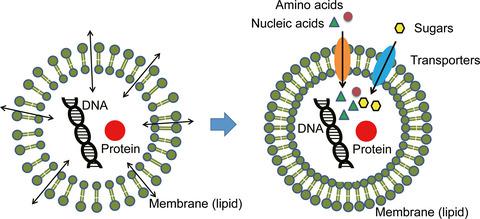当前位置:
X-MOL 学术
›
FEBS Lett.
›
论文详情
Our official English website, www.x-mol.net, welcomes your
feedback! (Note: you will need to create a separate account there.)
ABC Proteins in Evolution
FEBS Letters ( IF 3.0 ) Pub Date : 2020-10-13 , DOI: 10.1002/1873-3468.13945 Fumihiko Ogasawara 1 , Atsushi Kodan 1 , Kazumitsu Ueda 1
FEBS Letters ( IF 3.0 ) Pub Date : 2020-10-13 , DOI: 10.1002/1873-3468.13945 Fumihiko Ogasawara 1 , Atsushi Kodan 1 , Kazumitsu Ueda 1
Affiliation

|
ATP‐binding cassette (ABC) proteins play diverse roles in all living organisms, making them an attractive model for evolution. Early evolution of ancestral unicellular organisms entailed the acquisition of at least three types of ABC proteins: type 1 ABC proteins to import nutrients, and type 2 and 3 ABC proteins to generate the outer cell membrane by flopping and loading lipids onto acceptors, respectively. To export various toxic lipophilic compounds, cells evolutionarily acquired a fourth type of ABC protein. This suggests that ABC proteins may have played an important role in evolution, especially when life became terrestrial, protecting plants and animals from water loss and pathogen infection. ABC proteins are also assumed to have accelerated the evolution of vertebrates by allowing cholesterol to function for intramembrane signaling. In this review, we discuss the roles of ABC proteins in the evolution of bacteria, plants, and animals.
中文翻译:

进化中的 ABC 蛋白质
ATP 结合盒 (ABC) 蛋白在所有生物体中扮演着不同的角色,使它们成为一个有吸引力的进化模型。祖先单细胞生物的早期进化需要获得至少三种类型的 ABC 蛋白:1 型 ABC 蛋白用于输入营养,2 型和 3 型 ABC 蛋白分别通过将脂质翻转和加载到受体上来产生外细胞膜。为了输出各种有毒的亲脂性化合物,细胞在进化上获得了第四种类型的 ABC 蛋白。这表明 ABC 蛋白可能在进化中发挥了重要作用,特别是当生命变成陆地时,保护植物和动物免受水分流失和病原体感染。ABC 蛋白也被认为通过允许胆固醇发挥膜内信号传导的作用来加速脊椎动物的进化。
更新日期:2020-10-13
中文翻译:

进化中的 ABC 蛋白质
ATP 结合盒 (ABC) 蛋白在所有生物体中扮演着不同的角色,使它们成为一个有吸引力的进化模型。祖先单细胞生物的早期进化需要获得至少三种类型的 ABC 蛋白:1 型 ABC 蛋白用于输入营养,2 型和 3 型 ABC 蛋白分别通过将脂质翻转和加载到受体上来产生外细胞膜。为了输出各种有毒的亲脂性化合物,细胞在进化上获得了第四种类型的 ABC 蛋白。这表明 ABC 蛋白可能在进化中发挥了重要作用,特别是当生命变成陆地时,保护植物和动物免受水分流失和病原体感染。ABC 蛋白也被认为通过允许胆固醇发挥膜内信号传导的作用来加速脊椎动物的进化。











































 京公网安备 11010802027423号
京公网安备 11010802027423号